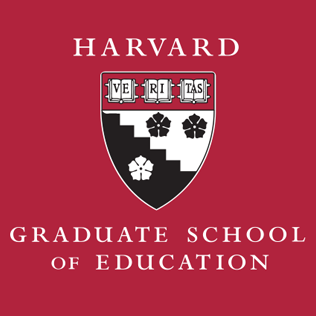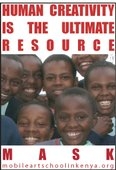Website
Countr(ies)
Programs offered primarily in Kenya, with some impact in Tanzania, and South Africa
Grade Level of Students Participating
Pre-K to Adult
Number of Students Participating per Year
Up to 250 students directly participate in school programs annually;
1,250 students directly participate in the MASK Prize program annually.
Year Organization Began
2007
Relationship to the public education system
Worked with more than 200 public schools in Kenya since founding
Organization’s Vision and Mission
Vision: The world where creativity is widely understood, learned and practiced.
Mission: To strengthen creativity and innovation in young people, and to champion a role of creativity for cultural and socio-economic development and change.
Brief Description of Program Activities
School programs are three-year courses. 1 to 1.5 hour lessons/workshops are held once a week, 30 workshops per year.
MASK operates different programs:
Creativity Clubs (primary schools) focus on experimental art and objects making and exhibitions of learned outcomes.
Creativity for Entrepreneurship and Leadership (CEL) (secondary schools) is a program where students develop creative skill and how to apply it in life situations. It aims to increase young people's employment rate and leadership skills. The program teaches students a clear and practical framework to help them see creativity and innovation as a series of steps (CEL 5-step process)
- Identifying a problem
- Brainstorming the solutions
- Evaluating the solutions against a sets of criteria
- Communicating solutions
- Implementing them, including developing partnership
- Show young people that they can choose entrepreneurship as a career and what is the entrepreneurial mindset
- Show young people that the effective leaders are creative people who inspire people to act for change, generate effective solutions to people's problems ('people don't follow people, people follow ideas'), and understand process of idea-implementation.
The Creativity for Peacebuilding and Extremism-prevention workshops are either organized in a series/block of sessions to focus intensely on the topic of peacebuilding, or they are incorporated in general Workshop/Cubs program.
The MASK Prize is a national creativity competition with prizes for schools and young people aged 3-25 years living in Africa, themed 'Young People-The Creative Nation'. The work submitted to this competition is shared with other young people from around the world. The MASK Prize partners with national press and media to achieve maximum reach (estimated 400K people in Africa annually).
Advocacy program is promoting values of art and creativity for socio-economic development in Africa by publications in national and specialist press and media, and by organizing exhibitions and seminars. MASK aims to work closely with the national and local authorities in Africa, and all program have been approved by the Kenyan Government.
Program Content: Intrapersonal Competencies
The program aims to foster the intrapersonal competencies of self-understanding and career orientation. In particular, the CEL program aims to increase young people's entrepreneurial mindset (pushing beyond the obvious), leadership (ability to bring change), and employability (the majority of employees consider creativity a primary hiring criterion) through education for creativity and innovation.
Program Content: Interpersonal Competencies
The program aims to foster the interpersonal competencies of empathy, the basis for peace education, and self-representation. Young people use painting as way of representing personal experiences - for example traumatic experience in war and violent conflicts - and empathizing with others’ stories. The programs also teaches multiculturalism and help to mitigate the difficulties of inter-ethnic understanding,
Program Content: Cognitive Competencies
The program aims to foster students’ creative skills including visual thinking (observation and visualization skills), divergent thinking, and the ability to connect concepts and ideas across a wide range of knowledge and disciplines to generate novel and practical solutions to solve problems. The program also covers the ability to evaluate, communicate, and implement ideas.
Program Content: Attitudes and Values
The program aims to foster the attitudes of valuing the importance of art and creativity in education and socio-economic development of society. It also aims to cultivate “creative character” meaning resilience, confidence and self-realization.
Program Content: Pedagogy/Active Engagement of Students
MASK delivers its programs by specially trained facilitators using the following pedagogical methods:
- Making arts and objects with focus on experimentation
- Creativity techniques and strategies (de-structuring imagination, associative thinking, forming analogies, and others)
- Applying creativity to real-life situations in schools and communities
- Exhibitions, competitions, seminars
Reference list
1All information from this table come from MASK's website and phone conversation with founder Alla Tkachuk in May 2016
Additional Notes
The school is also known as Mobile Art School Kenya, M.A.S.K.
Participating students are:
- School and non-school goers
- Living in rural communities, poor, disadvantaged, disabled, victims of conflict and violence
An independent graduate thesis studying MASK and its impact: "The Impact of Art Education in the Developing World: the Study of, MASK", by Brittany Glem MA,Institute of Education, University of London, 2011
Notes prepared by
Vincent Chunhao Qian


